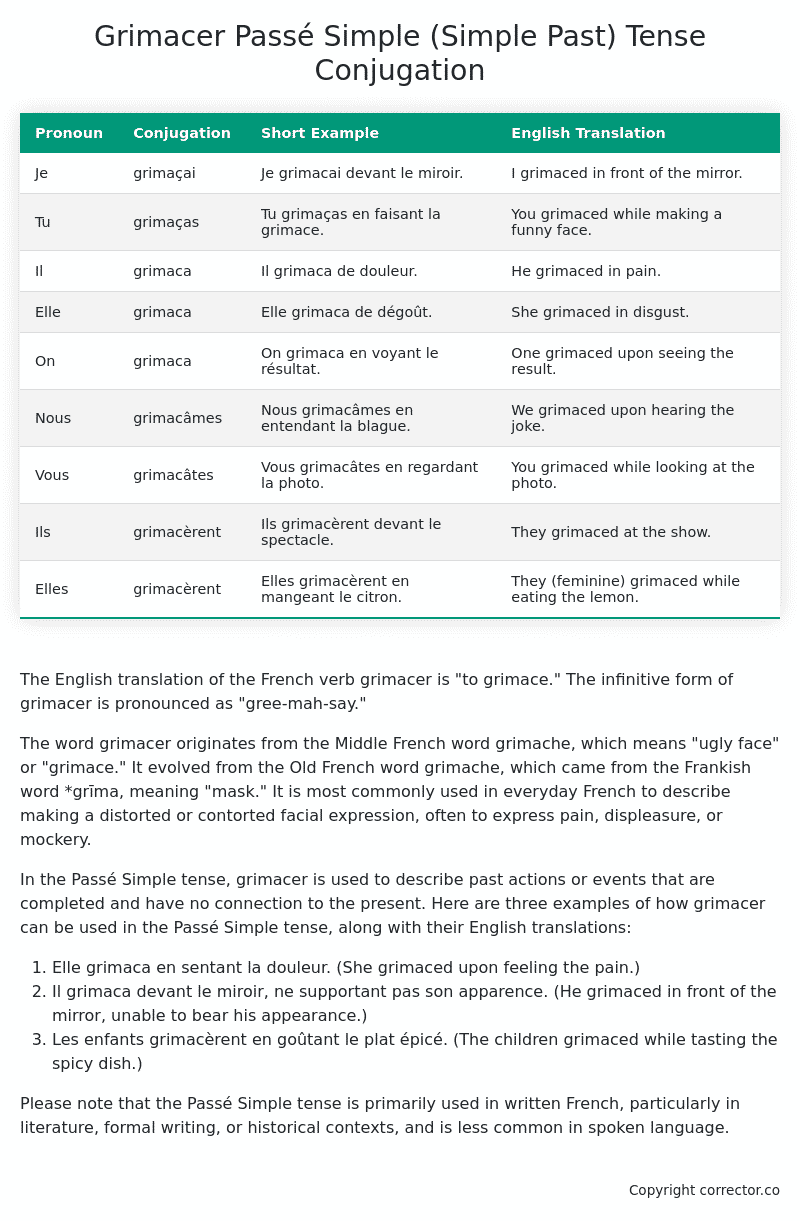Passé Simple (Simple Past) Tense Conjugation of the French Verb grimacer
Introduction to the verb grimacer
The English translation of the French verb grimacer is “to grimace.” The infinitive form of grimacer is pronounced as “gree-mah-say.”
The word grimacer originates from the Middle French word grimache, which means “ugly face” or “grimace.” It evolved from the Old French word grimache, which came from the Frankish word *grīma, meaning “mask.” It is most commonly used in everyday French to describe making a distorted or contorted facial expression, often to express pain, displeasure, or mockery.
In the Passé Simple tense, grimacer is used to describe past actions or events that are completed and have no connection to the present. Here are three examples of how grimacer can be used in the Passé Simple tense, along with their English translations:
- Elle grimaca en sentant la douleur.
(She grimaced upon feeling the pain.) - Il grimaca devant le miroir, ne supportant pas son apparence.
(He grimaced in front of the mirror, unable to bear his appearance.) - Les enfants grimacèrent en goûtant le plat épicé.
(The children grimaced while tasting the spicy dish.)
Please note that the Passé Simple tense is primarily used in written French, particularly in literature, formal writing, or historical contexts, and is less common in spoken language.
Table of the Passé Simple (Simple Past) Tense Conjugation of grimacer
| Pronoun | Conjugation | Short Example | English Translation |
|---|---|---|---|
| Je | grimaçai | Je grimacai devant le miroir. | I grimaced in front of the mirror. |
| Tu | grimaças | Tu grimaças en faisant la grimace. | You grimaced while making a funny face. |
| Il | grimaca | Il grimaca de douleur. | He grimaced in pain. |
| Elle | grimaca | Elle grimaca de dégoût. | She grimaced in disgust. |
| On | grimaca | On grimaca en voyant le résultat. | One grimaced upon seeing the result. |
| Nous | grimacâmes | Nous grimacâmes en entendant la blague. | We grimaced upon hearing the joke. |
| Vous | grimacâtes | Vous grimacâtes en regardant la photo. | You grimaced while looking at the photo. |
| Ils | grimacèrent | Ils grimacèrent devant le spectacle. | They grimaced at the show. |
| Elles | grimacèrent | Elles grimacèrent en mangeant le citron. | They (feminine) grimaced while eating the lemon. |
Other Conjugations for Grimacer.
Le Present (Present Tense) Conjugation of the French Verb grimacer
Imparfait (Imperfect) Tense Conjugation of the French Verb grimacer
Passé Simple (Simple Past) Tense Conjugation of the French Verb grimacer (You’re reading it right now!)
Passé Composé (Present Perfect) Tense Conjugation of the French Verb grimacer
Futur Simple (Simple Future) Tense Conjugation of the French Verb grimacer
Futur Proche (Near Future) Tense Conjugation of the French Verb grimacer
Plus-que-parfait (Pluperfect) Tense Conjugation of the French Verb grimacer
Passé Antérieur (Past Anterior) Tense Conjugation of the French Verb grimacer
Futur Antérieur (Future Anterior) Tense Conjugation of the French Verb grimacer
Subjonctif Présent (Subjunctive Present) Tense Conjugation of the French Verb grimacer
Subjonctif Passé (Subjunctive Past) Tense Conjugation of the French Verb grimacer
Subjonctif Imparfait (Subjunctive Imperfect) Tense Conjugation of the French Verb grimacer
Subjonctif Plus-que-parfait (Subjunctive Pluperfect) Tense Conjugation of the French Verb grimacer
Conditionnel Présent (Conditional Present) Tense Conjugation of the French Verb grimacer
Conditionnel Passé (Conditional Past) Tense Conjugation of the French Verb grimacer
Conditionnel Passé II (Conditional Past II) Tense Conjugation of the French Verb grimacer
L’impératif Présent (Imperative Present) Tense Conjugation of the French Verb grimacer
L’impératif Passé (Imperative Past) Tense Conjugation of the French Verb grimacer
L’infinitif Présent (Infinitive Present) Tense Conjugation of the French Verb grimacer
L’infinitif Passé (Infinitive Past) Tense Conjugation of the French Verb grimacer
Le Participe Présent (Present Participle) Tense Conjugation of the French Verb grimacer
Le Participe Passé (Past Participle) Tense Conjugation of the French Verb grimacer
Struggling with French verbs or the language in general? Why not use our free French Grammar Checker – no registration required!
Get a FREE Download Study Sheet of this Conjugation 🔥
Simply right click the image below, click “save image” and get your free reference for the grimacer Passé Simple tense conjugation!

Grimacer – About the French Passé Simple (Simple Past) Tense
Formation
Usage
Narration
Historical Context
Interactions with other tenses
Passé Composé
Imparfait
Conditional and Subjunctive
Summary
I hope you enjoyed this article on the verb grimacer. Still in a learning mood? Check out another TOTALLY random French verb conjugation!


